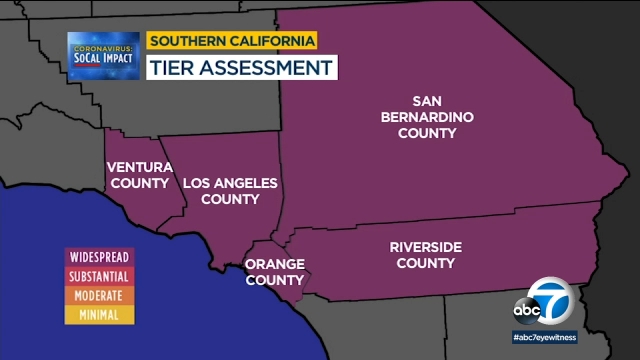Indoor dining, movie theaters, gyms: Here's what will reopen in LA County on Monday

LOS ANGELES (KABC) -- Officials on Friday announced that Los Angeles County will officially move into the state's less-restrictive red tier on Monday, with the state achieving a milestone of 2 million COVID-19 vaccine doses in hard-hit communities and prompting an easing of requirements for counties to advance in the economic-reopening blueprint.
County officials said the move out of the purple tier and into red will be effective at 12:01 a.m. Monday, meaning indoor dining can return and movie theaters and indoor fitness centers can reopen, all at limited capacity.
It had been uncertain whether the county would align itself with state guidelines or opt to keep more stringent restrictions in place, but under guidance released Thursday, several types of businesses and activities will be allowed under the red tier.
As of Thursday morning, the state had administered 1,971,784 vaccine doses in low-income communities.
L.A. County Public Health Director Barbara Ferrer had previously said the county was expected to officially advance to the red tier 48 hours after the state met the vaccination threshold.
RELATED: Newsom says state about to hit vaccination target, letting most SoCal counties shift to red tier

Under the new guidance, indoor dining can resume at 25% capacity.
The county will require restaurants to have 8 feet of distance between all tables, which will be restricted to a maximum of six people from the same household. The rules also call for ventilation to be increased "to the maximum extent possible."
Restaurant servers are already required to wear a face mask and a face shield. With the new rules, the Department of Public Health "strongly recommends'' that employees upgrade their face coverings, through the use of higher-grade N95 or KN95 masks, or a combination of double-masking and a face shield.
Health officials also strongly recommend that all employees be informed about and offered the chance to be vaccinated against COVID-19. Food service workers are already eligible to receive the shots.
Rules for other businesses once the county enters the red tier largely align with state guidance:
Moving to the red tier will also allow the reopening of theme parks as early as April 1 -- including Disneyland Resort in Orange County and Universal Studios Hollywood in Los Angeles County -- at 15% of capacity, with in-state visitors only.
On Tuesday, Disney CEO Bob Chapek said the company plans to reopen Disneyland and Disney California Adventure Park by late April.
The rules also permit resumption of activities at institutes of higher education, and reopening of in-person instruction for students in grades 7-12. Private indoor gatherings are also permitted for people from up to three different households, with masking and physical distancing. People who are vaccinated can gather in small groups indoors without masking or distancing.
Under Gov. Gavin Newsom's most recent guidelines, when the state reaches the 2-million vaccine milestone in low-income communities, counties will be able to move out of the most restrictive purple tier of the blueprint when their average rate of daily new COVID-19 infections reaches 10 per 100,000 residents -- a looser standard than the current 7 per 100,000 residents.
Under the new guidelines, Los Angeles and Orange counties qualified to move to the less-restrictive red tier, since they have both been under the 10 per 100,000 standard for two weeks. Los Angeles County's new case rate is currently 5.2 per 100,000 residents, while Orange County's is 6 per 100,000.
The idea behind the 2 million-dose threshold is to ensure that vaccines are being distributed equitably throughout the state, ensuring that low-income communities that have been disproportionately impacted by the COVID-19 pandemic are not overlooked in the vaccination effort. Newsom has ordered that 40% of the state's vaccine supply be earmarked to ensure equity in the distribution process.
Ferrer warned the county Board of Supervisors on Tuesday that while case numbers and the testing-positivity rate in the county have declined precipitously in recent weeks, things could easily worsen if residents become lax about infection-control measures.
"This is the month I would say -- the month of March, the early part of April -- where we have to be extraordinarily cautious,'' she said. "Because we've been here before. We've been here with reopenings. We've been here with travel around Thanksgiving and Christmas. We've seen what happens around holidays if we're not really careful. ... We've got to keep everybody alive right now so they can get vaccinated and stay alive. So this would be a time for extreme caution.''
City News Service contributed to this report.











